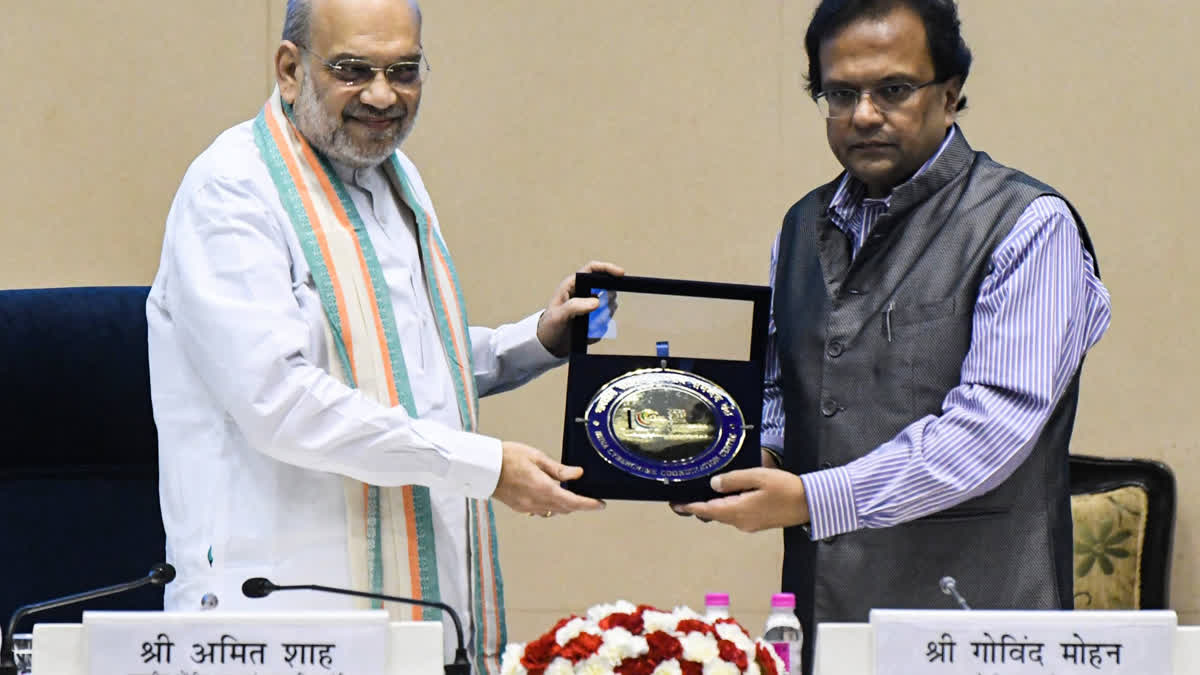New Delhi: Stating that no single organisation or institution can secure cyberspace single-handedly, Home Minister Amit Shah on Tuesday asked all stakeholders to come together on one platform and move forward on the same method and path.
Shah called upon I4C to continue awareness, coordination and joint efforts with the concerned stakeholders.
"No single institution can keep cyberspace secured single-handedly. This is possible only when many stakeholders come on the same platform and move forward on the same method and path," said Shah while addressing the first Foundation Day program of the Indian Cyber Crime Coordination Centre (I4C) here.
He said that the Cyber Fraud Mitigation Centre (CFMC) should work to identify the modus operandi of cyber criminals using different data and prevent it.
"Under the Cyber Commando programme, a target has been set to prepare about 5,000 cyber commandos in five years," said Shah.
Shah further said that CFMC has also been inaugurated with the idea of bringing banks, financial institutions, telecom companies, Internet Service Providers and police on a single platform and this will become a major platform for the prevention of cybercrime in the coming days.
Shah said in a vast country like India, having a separate Cyber Suspect Registry for each state would not serve any purpose because states have their own boundaries but cyber-criminals have no boundaries.
"It was the need of the hour to create a Suspect Registry at the national level and connect states with it to create a common platform to fight cybercrime. This initiative will help us a lot in preventing cyber crimes in the coming days," he said.
Shah underlined that I4C was established in 2015 under the 'Safe Cyber Space' campaign on the initiative of Prime Minister Narendra Modi, since then it is continuously moving towards becoming a strong pillar of a cyber-secured India.
He added that in the nine-year journey from 2015 to 2024, this idea turned into an initiative and then into an institution and now it is moving towards becoming a huge pillar of a cyber-secured India.
Shah said the development of any country is impossible without cyber security. He said that technology proves to be a blessing for human life and today technology is being used extensively in all new initiatives.
"The increasing use of technology is also creating many threats and that is why cybersecurity is no longer limited to the digital world but has also become an important aspect of national security. Platforms like I4C can make a huge contribution in dealing with such threats," Shah said.
Shah also said from today onwards, I4C is also starting a public awareness campaign.
"Efforts will be made to speed up this campaign through more than 72 TV channels, 190 Radio FM channels, cinema halls and many other platforms in the country. This campaign cannot be successful unless the victim knows how to avoid cyber-crime," he said.
Shah said creating awareness about the cyber-crime helpline 1930 and other platforms of I4C will increase its utility and help people prevent cyber-crimes.
Shah said the number of internet users in the country was 25 crores on March 31, 2014, and it is 95 crores on March 31, 2024.
"Due to the increase in downloading speed and reduction in cost, data consumption has also increased a lot. Earlier the average usage was 0.26 GB which has increased by almost 78 times to 20.27 GB today. Due to the Digital India initiative, many facilities have become online in the country," he said.
Shah said that 35 crore Jan Dhan accounts, 36 crore Rupay debit cards, and transactions worth Rs 20 lakh 64,000 crore have been done digitally in 2024.
"46 per cent of the world's digital transaction volume is taking place in India today. When digital accounts and digital transactions increase, the need for protection from digital fraud also increases a lot," he asserted.
Shah said that in three new criminal laws – Bharatiya Nyaya Sanhita (BNS), Bharatiya Nagrik Suraksha Sanhita (BNSS) and Bharatiya Sakshya Adhiniyam (BSA) – all legal arrangements have been made to make the country-cyber secured.
He said that through many technology-driven initiatives, they have been given a legal form. "Many efforts have been made to ensure that investigation is based on scientific methods and to improve the quality of the probe," he said.
Shah said all state governments and the Ministry of Home Affairs should take the initiative and organise an awareness fortnight after six months to popularise the national helpline number 1930.
The Home Minister dedicated CFMC to the nation and launched the Samanvay platform (Joint Cyber Crime Investigation Facility System). Shah also inaugurated the 'Cyber Commandos' program and Suspect Registry. He also unveiled the new logo, vision and mission of I4C.
